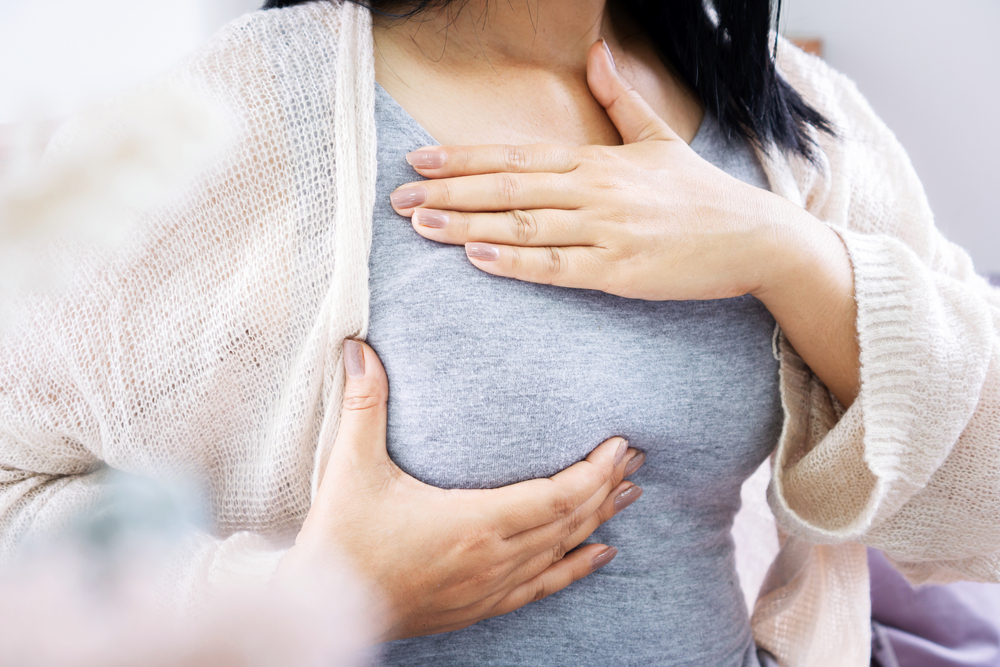Ladies! We know how sensitive our nipples are. But what happens when they suddenly become sore and tender, causing discomfort with even the slightest touch? Sore nipples can be an uncomfortable experience for anyone.
Let’s discuss the dilemma of sore nipples, the common causes, and effective home remedies to alleviate the pain. So, let’s explore this tender topic and find some relief!
Table of Contents
How Do the Sore Nipples Feel Like?
Picture this: you’re getting dressed or trying to adjust your bra, and suddenly you feel a sharp, stinging pain in your nipples. Ouch!
The discomfort can be mild or intense, and sometimes it may feel like a burning sensation, making you wonder what could be causing this trouble.
What are the Causes of Sore Nipples?
Sore nipples are not only physically painful, but they can also be emotionally distressing. So, let’s get to the bottom of this issue.
Friction and Chafing
One of the most common causes of sore nipples is friction or chafing.
Activities like running, vigorous exercise, or wearing tight clothing can irritate the delicate skin around the nipples, leading to soreness and discomfort.
Hormonal Changes
For women, hormonal fluctuations during menstruation, pregnancy, and breastfeeding can trigger nipple soreness.
Research shows estrogen and progesterone levels have a role in breast tissue changes, making nipples more sensitive.
Allergic Reactions
Harsh chemicals in soaps, laundry detergents, or fabrics can cause allergic reactions on the skin, leading to sore nipples.
Be mindful of the products you use and opt for gentle, hypoallergenic options.
Suggested Read: Remedies to Deal with Itchy Nipples!
Weather Conditions
Extreme temperatures, especially cold weather, can cause nipple chills. It, in turn, may lead to soreness. Protecting your nipples during colder months can make a significant difference.
Infections
Sometimes, bacterial or fungal infections can affect the nipples. They may cause pain and soreness. Proper hygiene and prompt treatment are essential in these cases.
Incorrect Latching during Breastfeeding
For breastfeeding mothers, improper latching of the baby onto the breast can lead to nipple soreness. Seeking guidance from a lactation consultant can help address this issue.
Suggested Read: Some common breastfeeding questions and their answers!
Eczema or Dermatitis
Skin conditions like eczema or dermatitis can also manifest around the nipple area, leading to soreness and discomfort.
Home Remedies to Soothe Sore Nipples!
Now that we’ve identified some common causes, let’s explore simple and effective home remedies to ease sore nipple pain:
Apply a Warm Compress or a Cold One!
Applying a warm compress to your nipples can help relax the surrounding muscles and improve blood circulation. It can reduce soreness and provide relief.
If soreness is due to inflammation or chafing, a cold compress can reduce swelling and numb the area, providing immediate comfort.
Natural Oils can Help!
Applying soothing natural oils like coconut oil, olive oil, or calendula oil can moisturize the nipples. It reduces irritation and promotes healing.
Aloe Vera Gel
Known for its healing properties, aloe vera gel can alleviate soreness and provide a cooling effect on the nipples.
Breast Pads
For breastfeeding mothers, using soft breast pads can cushion and protect sore nipples from rubbing against clothing.
Dr. Rabia Nosheen, a prominent Gynecologist, advises nursing mothers experiencing sore nipples to ensure that their baby is latching correctly. Seek guidance from a lactation consultant to help you find a comfortable breastfeeding position.
Avoid Irritants
Identify and avoid products that trigger allergic reactions or irritation, such as perfumed soaps, lotions, or synthetic fabrics.
Supportive Bras
Choosing well-fitting, supportive bras can reduce friction and movement, preventing further irritation to sore nipples. Look for bras made from soft, breathable fabrics without underwires.
Nipple shields can act as a protective barrier between the nipple and your baby’s mouth during breastfeeding, reducing direct contact and alleviating soreness.
If you’re experiencing sore nipples due to friction, giving your breasts some time without a bra can be beneficial. Just make sure you’re in a comfortable and supportive environment.
Hydration and Nutrition
Staying well-hydrated and maintaining a balanced diet can promote overall breast health, potentially reducing nipple sensitivity.
While showering, avoid using hot water directly on your nipples. Hot water can worsen the irritation and dry out the skin, making soreness worse.
Natural healing salves containing ingredients like chamomile or shea butter can soothe sore nipples and aid in healing.
How to Prevent Sore Nipples?
Prevention is better than cure, and here are some tips to keep healthy, sore-free nipples:
- Proper Hygiene: Maintain good breast hygiene by cleaning your nipples with gentle soap and water daily. Pat them dry instead of rubbing them.
- Moisturize Regularly: Keep your nipples moisturized with natural oils or lanolin to prevent dryness and cracking.
- Protect in Cold Weather: In colder climates, shield your nipples from the chilly air by wearing warm layers and protecting them with soft fabrics.
- Breast Support During Exercise: Wear a well-fitting sports bra that provides adequate support during exercise to minimize friction.
- Nursing Techniques: If breastfeeding, focus on correct latching and ensure your baby’s mouth covers the nipple and areola.
When to Go to a Gynecologist for Sore Nipples?
While sore nipples are usually not a cause for concern, certain situations warrant medical attention, and you should consult a qualified female doctor for that:
- Persistent Pain: If the soreness persists despite trying home remedies and lifestyle changes.
- Signs of Infection: If you notice redness, warmth, or discharge from the nipples, it could indicate an infection that requires medical evaluation.
- Fever or Chills: Sore nipples accompanied by fever or chills can be due to an underlying issue that needs medical attention.
- Unexplained Changes in Breast Tissue: If you notice any lumps, bumps, or changes in breast tissue alongside sore nipples.
Final Thoughts!
Sore nipples can be an uncomfortable and distressing experience, but understanding the causes and taking appropriate steps can help alleviate the pain.
Remember to protect your nipples from friction, keep them moisturized, and use gentle remedies to soothe discomfort.
